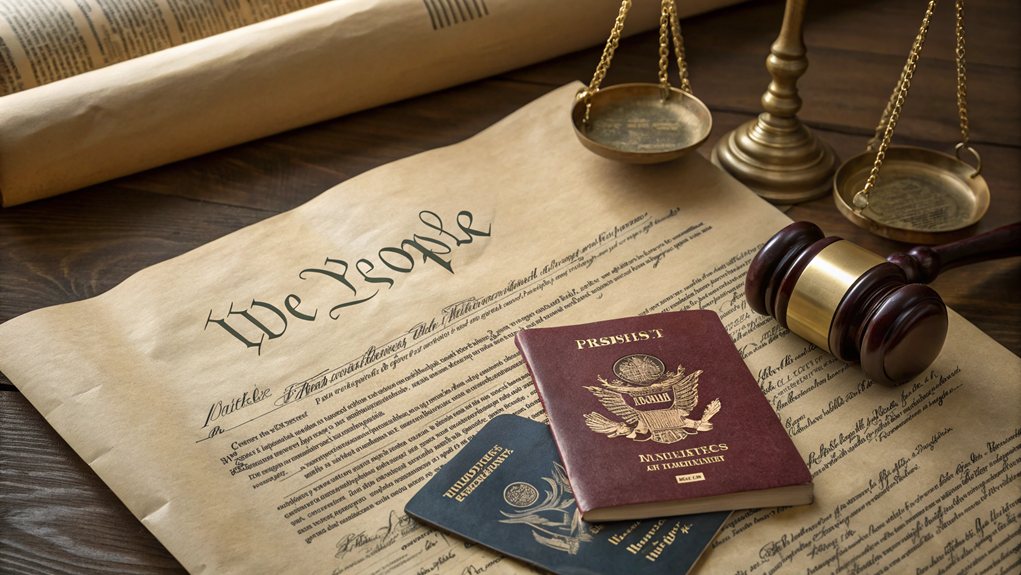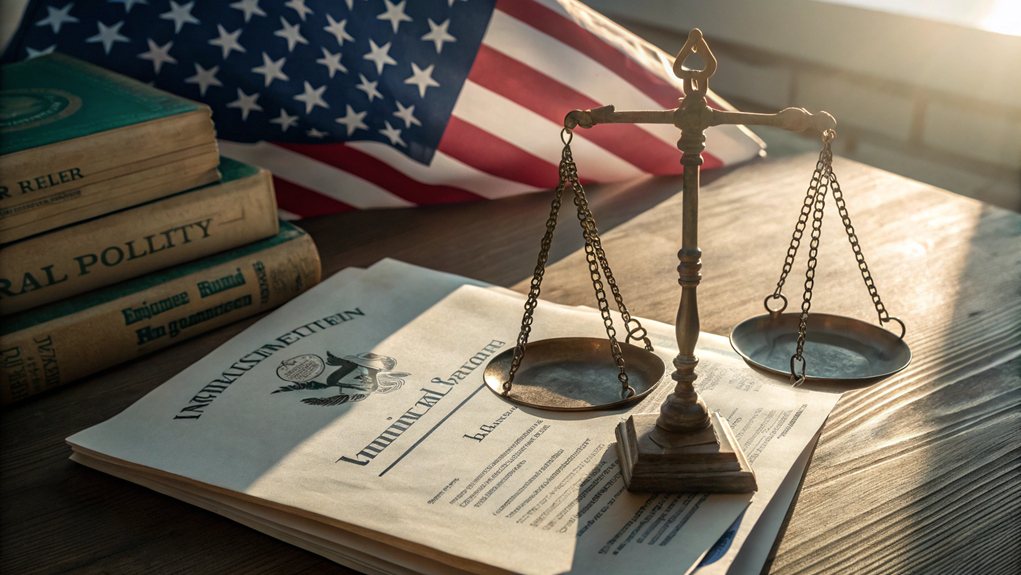Non-citizens in the U.S. have rights. Shocking, right? They get due process under the Fifth Amendment. Equal protection? Yep, thanks to the Fourteenth Amendment. They must have fair hearings in deportation cases and can bring evidence to defend themselves. Can't vote in federal elections, though. But hey, they can still go to school and join unions. Plus, they can express opinions and practice their faith. Curious about more? Stick around for the details.

What rights do non-citizens really have under the U.S. Constitution? It's a bit of a mixed bag, really. On one hand, the Constitution doesn't just belong to citizens. The Fifth Amendment states that no person can be deprived of life, liberty, or property without due process. That's right, non-citizens too. They also get the sweet deal of the Fourteenth Amendment, which guarantees equal protection under the law to all persons. So, they're not completely out in the cold. The courts have played a crucial role in interpreting these rights and ensuring that non-citizens receive certain protections under the Constitution.
Non-citizens enjoy certain constitutional rights, like due process and equal protection—so they're not entirely left out in the cold.
Now, let's talk about legal proceedings. Non-citizens have rights here too. They get a fair hearing in deportation cases. They have to be informed of the charges against them. And guess what? They can present evidence in their defense. They even have the right to legal counsel. Crazy, right? But hold up—there's a catch. They might not get a speedy trial, at least not guaranteed. Non-citizens must show immigration papers if requested by an immigration agent, ensuring that due process is respected during legal encounters. Additionally, they are entitled to due process protections during deportation proceedings, which reinforces their legal rights.
Just don't try to pull a fast one with voting. Non-citizens are mostly barred from federal elections. Some states allow them to vote locally, but good luck with that. Voting illegally? Don't even think about it—penalties can include prison time or deportation.
And what about family rights? Courts recognize a right to familial association, though it's not explicitly in the Constitution. Kids? Yeah, they can go to public school, thanks to Plyler v. Doe. Non-citizens can also express their opinions, practice their religion, assemble peacefully, and petition the government.
When it comes to work, they have rights too. Non-citizens can't be paid less than minimum wage or denied workers' compensation. They can join unions and fight for fair labor practices.
Frequently Asked Questions
Can Non-Citizens Vote in U.S. Elections?
No, non-citizens can't vote in U.S. elections—at least, not in the big leagues. Federal law puts a hard stop on that, and all states follow suit for their statewide elections.
Sure, some local areas let them cast votes, but that's like finding a needle in a haystack. Historically, non-citizen voting was a thing, but it vanished by 1926.
Now, it's just a hot topic, with little action behind it.
Are Non-Citizens Protected From Deportation Without Due Process?
Non-citizens aren't exactly free from the threat of deportation. They do have some protections, though—like the right to a hearing.
But here's the kicker: if you're caught near the border, good luck! Expedited removal can kick in, and suddenly, due process is just a nice idea.
Sure, they can present evidence, but it's a rough road. The system can seem more like a game of chance than justice. Not exactly reassuring, is it?
Do Non-Citizens Have Access to Public Education?
Non-citizens do have access to public education in the U.S.—surprise!
Thanks to the 1982 Supreme Court case Plyler v. Doe, undocumented kids can't be shut out of schools just because of their immigration status.
States like New Jersey and Massachusetts even offer in-state tuition for undocumented students.
But hey, higher education? That's a whole different ball game.
Financial aid? Good luck with that.
It's tough out there, folks.
Can Non-Citizens Serve on Juries?
So, can non-citizens serve on juries? Well, not in most cases. Federal law says "nope," only U.S. citizens get that honor.
It's a bit of a bummer, really. Think about it: diverse communities, yet the jury box looks like a homogenous club.
Sure, some states flirt with the idea, but for now, it's mostly a pipe dream. It's like arguing over who gets to play in a game—only the chosen few.
Are Non-Citizens Entitled to Government Benefits?
Non-citizens and government benefits? It's a mixed bag.
SSI? Only if they fit certain categories.
Medicaid? Forget it—unless it's an emergency.
SNAP? Nope, not for undocumented folks.
But hey, public education? That's a win for all kids.
Emergency services? Sure, come on in!
Just remember, proving your immigration status is a must.
The rules vary by state, so good luck sorting through that mess!
Benefits? It's complicated.







